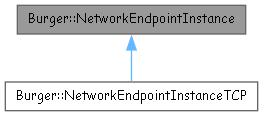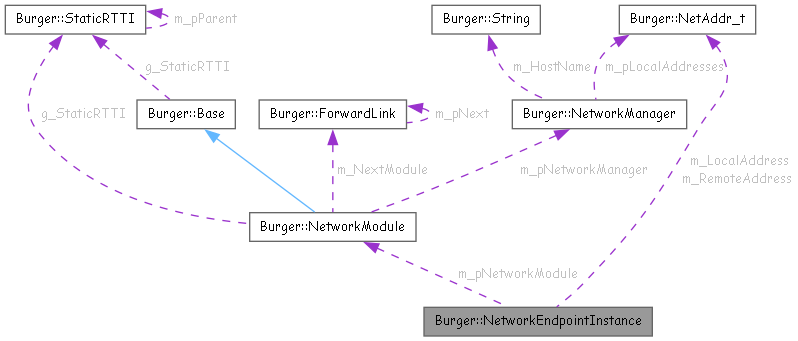Base class for network endpoint instances. More...


Public Types | |
| enum | eCallbackCode { kConnectionRequest , kAcceptionComplete , kHandoffComplete , kClosed , kDied , kUnblocked , kDatagramReceived , kStreamDataReceived , kPreprocessResponse } |
| Callback code for endpoint instance events. More... | |
| enum | eBlockMode { kNonBlocking , kBlocking } |
| Flag for enabling or disabling blocking on data transmission. More... | |
| typedef void(* | CallbackProc) (void *pContext, eCallbackCode uCode, NetworkEndpointInstance *pInstance, eError uError, void *pExtra) |
| Function prototype for event callbacks. | |
Static Public Attributes | |
| static const uint32_t | kDefaultTimeout = 5000 |
| In milliseconds, 5 second timeout. | |
Protected Attributes | |
| NetworkModule * | m_pNetworkModule |
| Pointer to the parent NetworkModule. | |
| NetAddr_t | m_LocalAddress |
| Network address for local endpoint (All protocols supported) | |
| NetAddr_t | m_RemoteAddress |
| Network address for connected endpoint (All protocols supported) | |
Private Member Functions | |
| NetworkEndpointInstance (const NetworkEndpointInstance &)=delete | |
| NetworkEndpointInstance & | operator= (const NetworkEndpointInstance &)=delete |
| NetworkEndpointInstance (NetworkEndpointInstance &&)=delete | |
| NetworkEndpointInstance & | operator= (NetworkEndpointInstance &&)=delete |
Base class for network endpoint instances.
A NetworkEndpoint can have one or more NetworkEndpointInstance classes, this class is an abstract class for which others are derived from.
Since this is an abstract class, most functions must be implemented by derived classes.
| Burger::NetworkEndpointInstance::CallbackProc |
Function prototype for event callbacks.
When an event has occurred for an endpoint, a callback using this function prototype will be issued with the proper callback code.
| pContext | Pointer to the user supplied context for the callback. |
| uCode | callback code issued to denote the type of event that had occurred. |
| pInstance | Pointer to the NetworkEndpointInstance that caused this event. |
| uError | Error state, if any, that occurred before the call was issued. |
| pExtra | Pointer to extra data if needed by the callback code. |
Flag for enabling or disabling blocking on data transmission.
When calling Send() or SendDatagram(), this enum is used to alert the function if blocking is desired. If blocked, the function won't return until data is sent or a timeout.
| Enumerator | |
|---|---|
| kNonBlocking | Don't block on sending data. |
| kBlocking | Block until data is sent. |
Callback code for endpoint instance events.
When a NetworkEndpointInstance generates an event, a callback is issued and one of these codes is used to determine the event.
| Enumerator | |
|---|---|
| kConnectionRequest | The endpoint has received a connection request. |
| kAcceptionComplete | Connect has been accepted, pExtra has the parent NetworkEndpointInstance. |
| kHandoffComplete | Connection hand off is complete, pExtra has the NetworkEndpointInstance that generated the hand off. |
| kClosed | Endpoint has finished closing. |
| kDied | Endpoint has died (Lost connection or remote disconnect) |
| kUnblocked | Endpoint has restarted (Whatever blocked the endpoint has cleared) |
| kDatagramReceived | UDP/IPX datagram data has arrived. |
| kStreamDataReceived | TCP/SPX stream data has arrived. |
| kPreprocessResponse | Before a response is sent, allow the callback to do data munging (Obsolete) |
|
privatedelete |
|
privatedelete |
| Burger::NetworkEndpointInstance::NetworkEndpointInstance | ( | NetworkModule * | pNetworkModule | ) |
|
virtual |
Default destructor.
|
pure virtual |
Accept a remote connection request.
Attempt to connect to the remote endpoint. This can fail if the connection was interrupted before it could be acknowledged.
| pCallback | Pointer to a callback function that will be called to determine if a connection should be accepted or rejected. |
| pContext | Pointer to a context for the callback function. |
| pExtra | Pointer to the Endpoint that issued this accept request. |
Implemented in Burger::NetworkEndpointInstanceTCP.
|
pure virtual |
Close and dispose of a NetworkEndpointInstance.
Close an endpoint and if bOrderly is set to TRUE, issue calls to the network driver to notify any connected remote machine that this endpoint is to be shut down and disposed of. If bOrderly is FALSE, the socket is torn down and no attempt is made to notify the machine on the other side.
Implemented in Burger::NetworkEndpointInstanceTCP.
| Burger::eError BURGER_API Burger::NetworkEndpointInstance::GetLocalAddress | ( | String * | pOutput | ) |
Return the address of the local endpoint.
Convert the local network address into a string.
| pOutput | Pointer to a String that will receive the network address |
|
inline |
Return the pointer to the parent NetworkModule.
| Burger::eError BURGER_API Burger::NetworkEndpointInstance::GetRemoteAddress | ( | String * | pOutput | ) |
Return the address of the remote endpoint.
Convert the remote network address into a string.
| pOutput | Pointer to a String that will receive the network address |
Test if a stream connection with a remote machine is still active.
If a connection with a remote machine is active, return TRUE. Otherwise if the endpoint is invalid or not connected, it will return FALSE.
Implemented in Burger::NetworkEndpointInstanceTCP.
| Burger::eError BURGER_API Burger::NetworkEndpointInstance::NotificationLock | ( | eSocketFlags | uFlags | ) |
Obtain the endpoint lock.
When endpoints are being manipulated, it may require the module lock to be achieved to hold other threads until the endpoint is set to its new state. This function obtains the parent NetworkModule lock.
| uFlags | Either kSocketFlagDatagram or kSocketFlagStream for what kind of endpoint is needing the lock. |
| Burger::eError BURGER_API Burger::NetworkEndpointInstance::NotificationUnlock | ( | eSocketFlags | uFlags | ) |
Release the endpoint lock.
When endpoints are being manipulated, it may require the module lock to be achieved to hold other threads until the endpoint is set to its new state. This function releases the parent NetworkModule lock.
| uFlags | Either kSocketFlagDatagram or kSocketFlagStream for what kind of endpoint is releasing the lock. |
|
privatedelete |
|
privatedelete |
|
pure virtualnoexcept |
Poll for events.
On some platforms, endpoints require some CPU time from the application to perform housekeeping actions. Most platforms, this call performs no action because the network layer is all performed in its own thread.
Implemented in Burger::NetworkEndpointInstanceTCP.
|
pure virtual |
Receive data using guaranteed protocol.
If this endpoint is connected to a remote endpoint, check if the endpoint has data pending and if so, fill the buffer with as many bytes that can be obtained. Set pBytesReceived with the actual number of bytes read in, this value can be zero.
| pBytesReceived | Pointer to a value that will obtain the number of bytes received during this call. |
| pData | Pointer to a data buffer to hold the received data. |
| uDataSize | Size of the buffer that will hold the received data. |
Implemented in Burger::NetworkEndpointInstanceTCP.
|
pure virtual |
Receive data using non-guaranteed protocol.
If this endpoint is listening for packets, check if there is data pending and if so, fill the buffer with as many bytes that can be obtained. Set pBytesReceived with the actual number of bytes read in, this value can be zero.
| pBytesReceived | Pointer to a value that will obtain the number of bytes received during this call. |
| pData | Pointer to a data buffer to hold the received data. |
| uDataSize | Size of the buffer that will hold the received data. |
Implemented in Burger::NetworkEndpointInstanceTCP.
|
pure virtual |
Reject a remote connection request.
Reject a connection to a remote endpoint.
| pExtra | Pointer to the Endpoint that issued an accept request that should be rejected. |
Implemented in Burger::NetworkEndpointInstanceTCP.
|
pure virtual |
Send data using guaranteed protocol.
If this endpoint is connected to a remote endpoint, send data to that endpoint. This function can block until data is in the queue. If the function is not blocked, check the returned pBytesSent value to determine how much data couldn't be sent due to issues such at data blockage.
| pBytesSent | Pointer to a value that will obtain the number of bytes sent during this call. |
| pData | Pointer to a data buffer to transmit. |
| uDataSize | Number of bytes to transmit. |
| uMode | Either kBlocking if this function should block until error or all data is send or kNonBlocking if the function should return as soon as possible. |
Implemented in Burger::NetworkEndpointInstanceTCP.
|
pure virtual |
Send data using datagram protocol.
If this endpoint has an address for a destination endpoint, send data to that endpoint. This function can block until data is in the queue. If the function is not blocked, check the returned pBytesSent value to determine how much data couldn't be sent due to issues such at data blockage.
| pBytesSent | Pointer to a value that will obtain the number of bytes sent during this call. |
| pData | Pointer to a data buffer to transmit. |
| uDataSize | Number of bytes to transmit. |
| uMode | Either kBlocking if this function should block until error or all data is send or kNonBlocking if the function should return as soon as possible. |
Implemented in Burger::NetworkEndpointInstanceTCP.
|
pure virtual |
Set the endpoint instance time in milliseconds.
Set the timeout value for this endpoint instance in milliseconds.
| uTimeout | Timeout in milliseconds, 5 seconds is the default. kDefaultTimeout |
Implemented in Burger::NetworkEndpointInstanceTCP.
|
pure virtual |
Enable listening for broadcast packets.
When creating a game server, it may wish to advertise its existence to the local network. This function enables the ability for this endpoint to listen for broadcast packets from a client asking for information about this server.
Implemented in Burger::NetworkEndpointInstanceTCP.
|
pure virtual |
Disable listening for broadcast packets.
When creating a game server, it may wish to advertise its existence to the local network. This function disables the ability for this endpoint to listen for broadcast packets from a client asking for information about this server.
Implemented in Burger::NetworkEndpointInstanceTCP.
In milliseconds, 5 second timeout.
|
protected |
Network address for local endpoint (All protocols supported)
|
protected |
Pointer to the parent NetworkModule.
|
protected |
Network address for connected endpoint (All protocols supported)